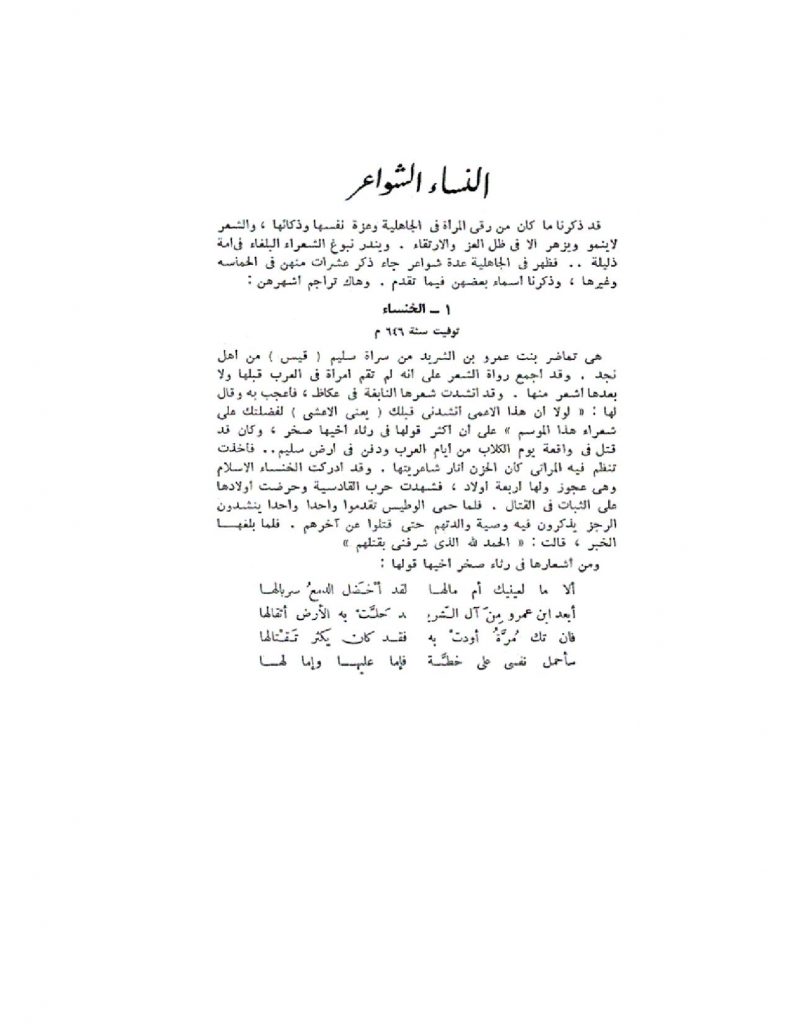
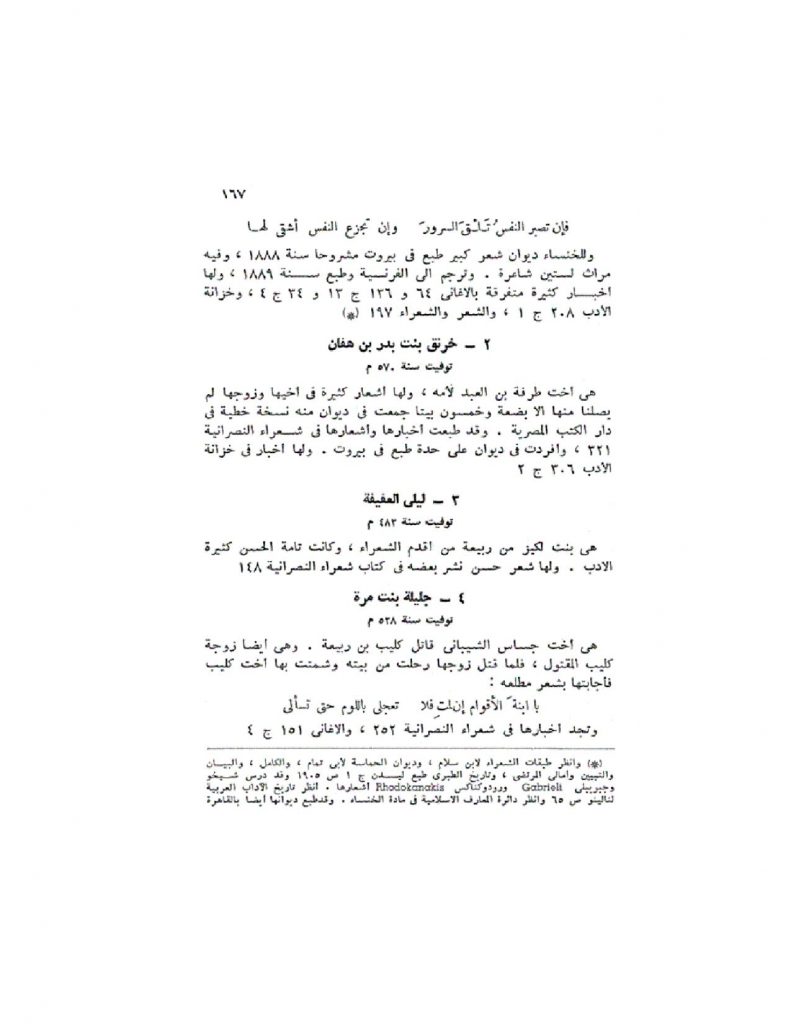
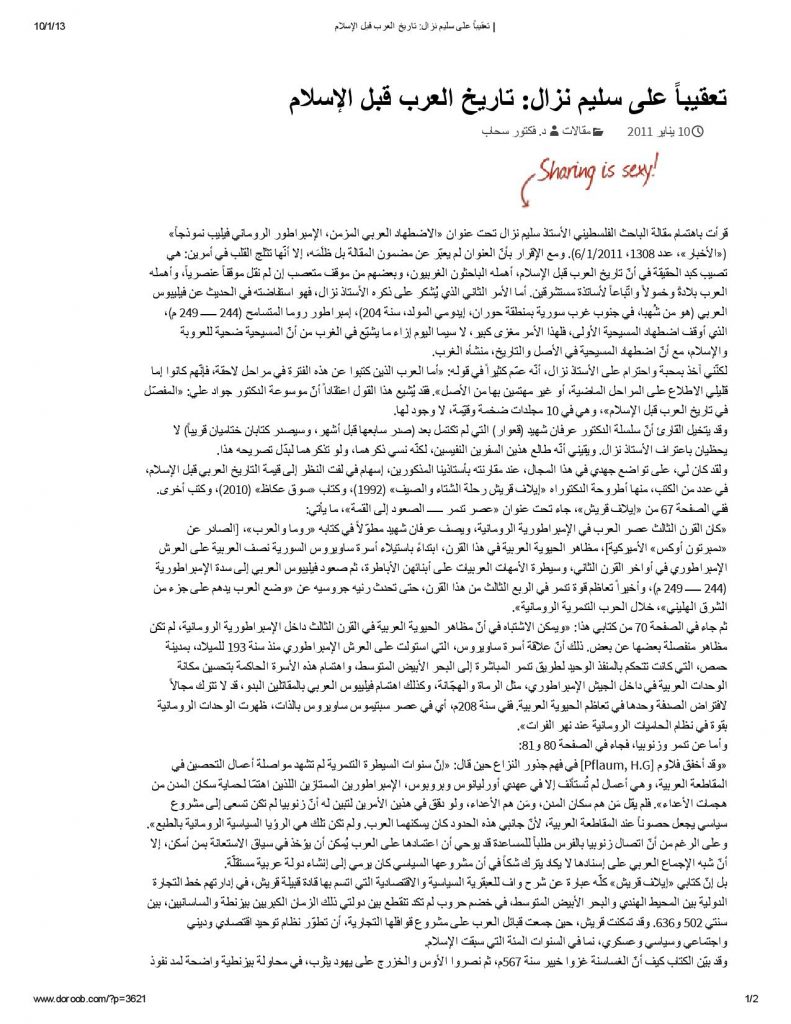
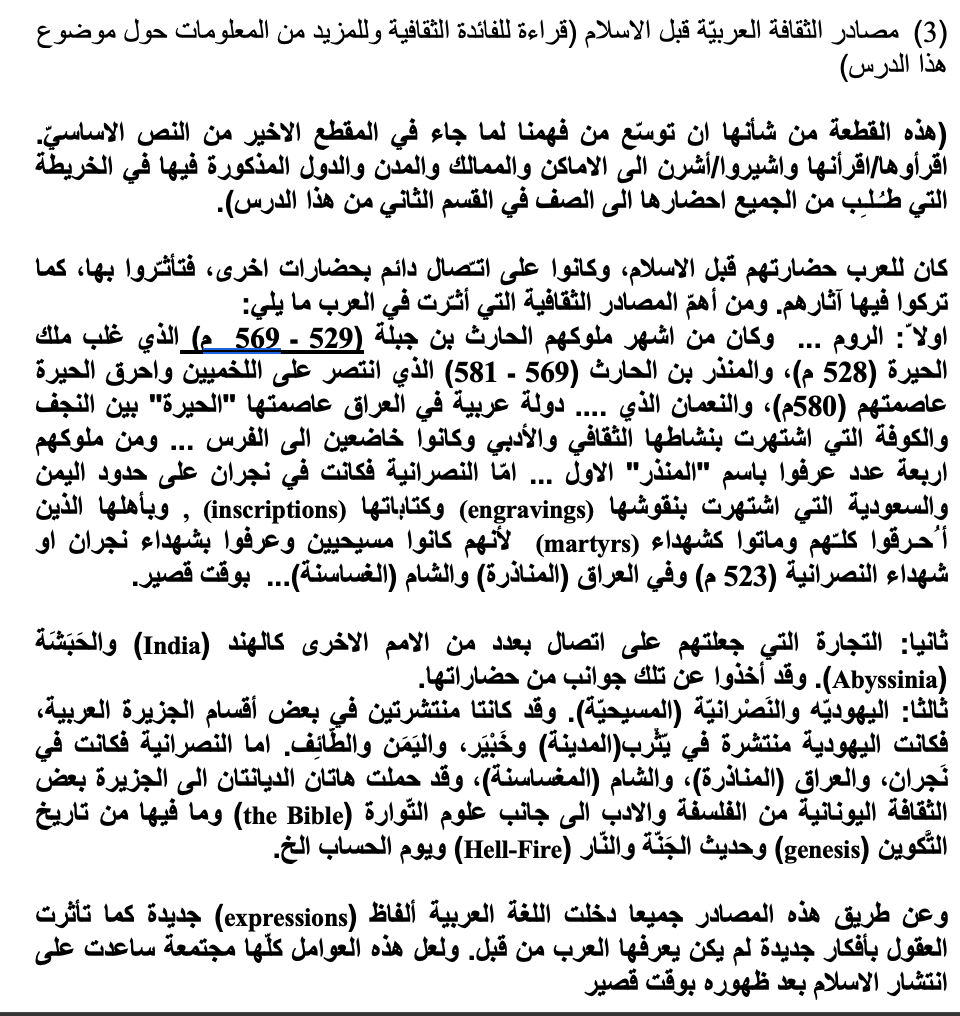
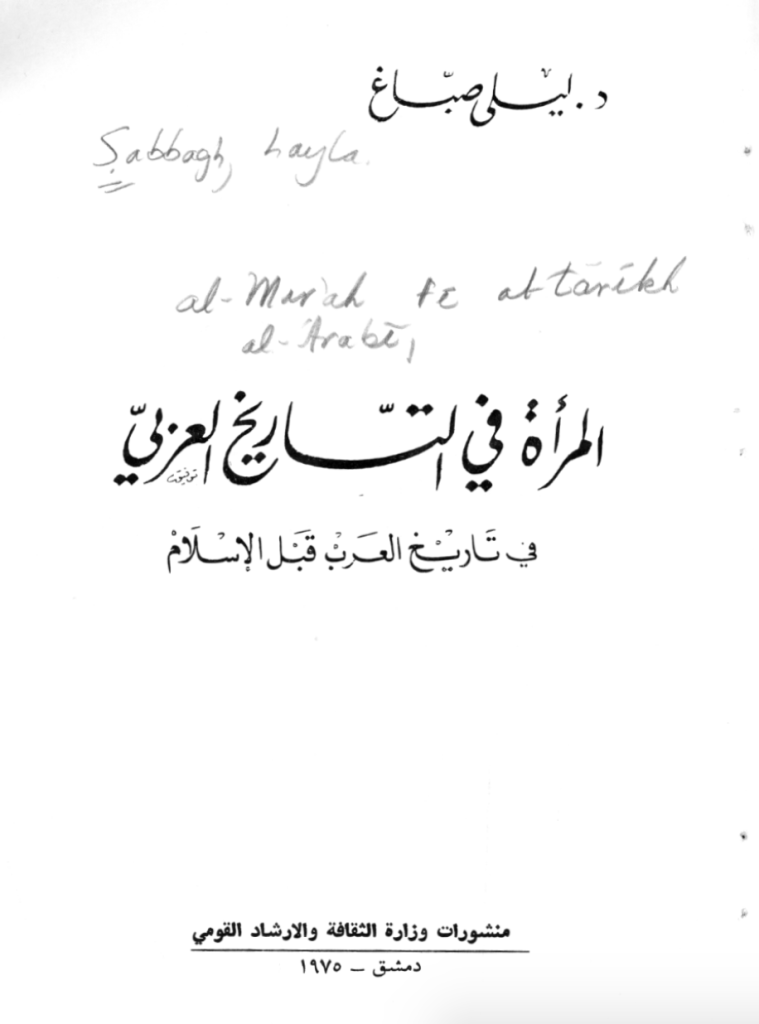
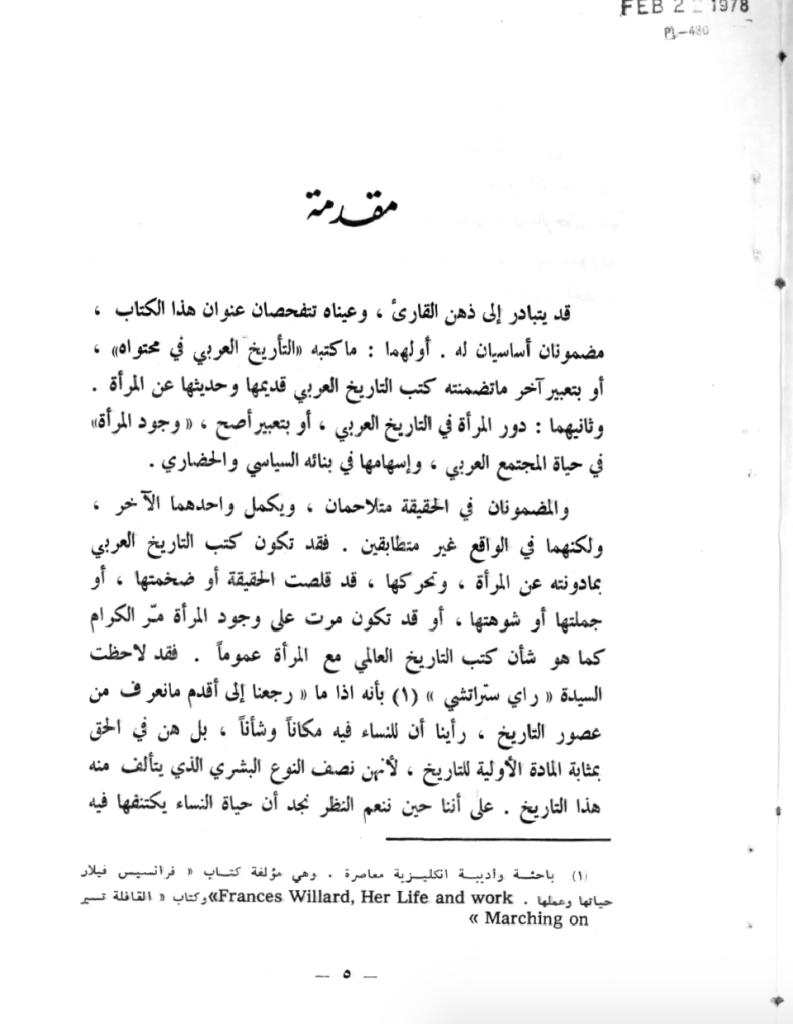
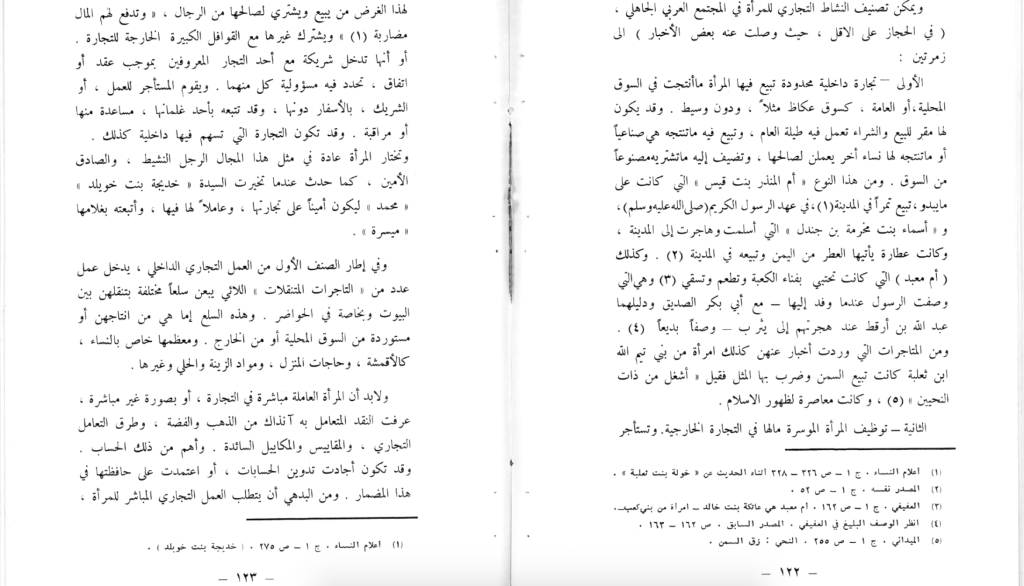
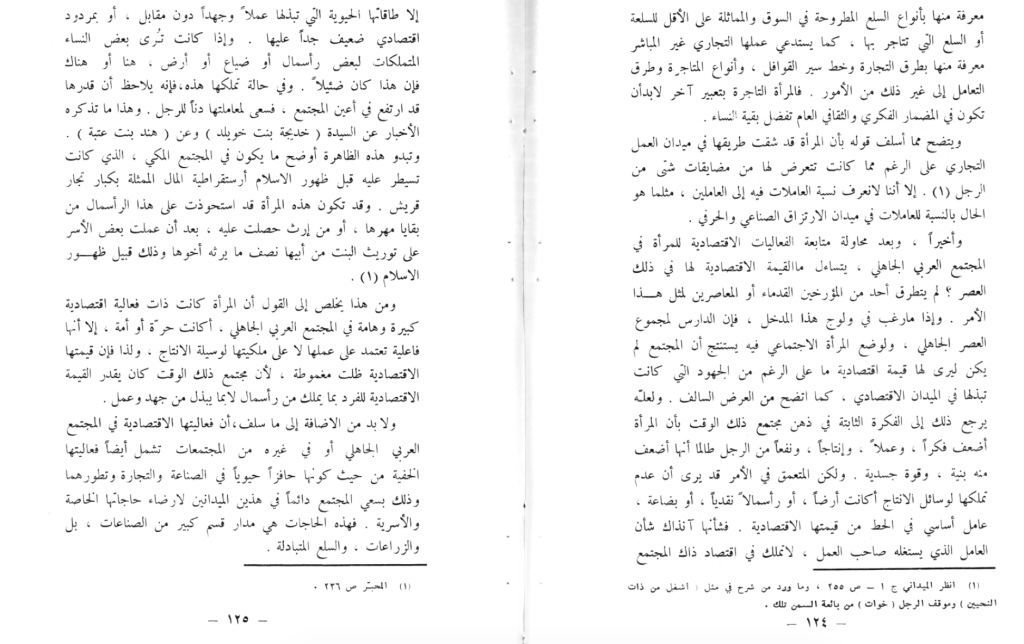
- Uses of كانَ
كان has two distinct functions: 1. as an auxiliary verb/فِعْل ناقص (“deficient verb”) and 2. as a main verb/فعل تامّ (“a full verb”).
- As an auxiliary, كان ‘to be’ is used to change the main verb from present to past or to future timing
a. If the main verb is an imperfect tense verb, it simply shifts the time to past time; some familiar examples are
يعيشون ‘they live; they are living’ vs.
كانوا يعيشون ‘they lived, they used to live; they were living’
“They live” is of course habitual or customary in meaning and refers to now, and “they are living” is progressive, an activity in progress now. In the past with كان it is equivalent to “they lived” or “they used to live” for habitual meaning and “they were living” for past progressive.
If the verb does not denote action–that is, is an actionless or stative verb–then either the English simple past tense verb is used to translate the two verbs or the main verb with “used to” may be used:
اعرفُها ‘I know her’ and
كنت اعرفُها ‘I knew her, I used to know her.’
b. The perfect tense verb denotes an action completed before the moment of speaking; used with the auxiliary كان it denotes an action that took place before another action also in the past did–your familiar past perfect tense. In this case the particle قد must be placed before the main verb, and if a subject (a noun or an independent pronoun) is expressed it comes between the auxiliary كان and the main verb; compare
دخلت زوجتُه المطبخَ ‘His wife entered the kitchen.’ and
كانت زوجته قد دخلت المطبخ ‘His wife had entered the kitchen.’
Note that in the perfect tenses the particle قَدْ occurs before the main verb.
c. Here is كان and its uses with imperfect and perfect tense main verbs.
(1) كان + imperfect tense puts the main verb in past time (i.e., before the moment of speaking):
Present habitual: يخلطون بين القلب والمعدة ‘they confuse their heart with their stomach’
Past habitual: كانوا يخلطون بين القلب والمعدة ‘they confused their heart with their stomach’
Present progressive: مادا يقول المُذيعُ؟ ‘What is the announcer saying?’
Past progressive : مادا كان المُذيع يقول ؟ ‘What was the announcer saying?’
Present stative: مادا تريد من المطبخ؟ ‘What do you want from the kitchen?’
Past stative : مادا كنت تريد من هناك؟ ‘What did you want from there?’
Future: ستسبِّب ثورة ‘they will cause a revolution’
Future in the past: كانت ستسبب ثورةً ‘they were going to cause a revolution’
(2) كان + perfect tense creates the perfect tenses:
Past : خرجت زوجتُهُ من المطبخِ ‘His wife came out of the kitchen’
Past perfect: كانت زوجته قد خرجت من المطبخ ‘His wife had come out of the kitchen’
Future : ستخرج من المطبخ ‘she will leave the kitchen’
Future perfect: ستكون قد خرجت من المطبخ ‘she will have left the kitchen’
Note that in the perfect tenses the particle قَدْ occurs before the main verb.
كان is the only auxiliary that can function as an auxiliary in both the perfect and the imperfect tenses and also take a main verb in either tense.
d. Negating auxiliary كان
(i) كان + قد
In this construction, the proper particle negates كان :
كانت قد بدأت عملها لم تكن قد بدأت عملها
She had not begun her work. She had begun her work.
كانت زوجته قد خرجت من المطبخ لم تكن زوجته قد خرجت من المطبخ
تكون الشمس قد غابت لا تكون الشمس قد غابت
(ii) imperfect كان +
Here the negative particle may negate كان or the verb that follows:
كنت اريد ان أسافر بالطائرة لم أكن اريد ان أسافر بالطائرة/ كنت لا اريد ان أسافر بالطائرة
Idid not want to travel by plane I wanted to travel by plane.
كنت اعرف شيئاً عن الموضوع لم أكن/ما كنت اعرف شيئاً عن …/ كنت لا اعرف شيئاً عن …
I didn’t know anything about … I knew something about the subject.
(iii) ) imperfect+ سَ+ كان
Here the negative particle negates كان
كان سيحضر لزيارتنا لم يكن سيحضر لزيارتنا
He was coming to visit us. He was not coming to visit us.
e. Negative كان (mostly withما but also with لم )may be followed by an imperfect verb in the subjunctive preceded by لِ (called لام الجُحود ‘the laam of denial’) to express the idea that something was not to be or an act would not happen:
ما كنت لِأطلبَ منه ايّ شيء او لِأحاول الاقتراب منه. I was not going to ask him anything or to even try to get close to him.
لم يكونوا ليسمحوا له بدخول البلاد. They would not allow him to enter the country.
ما كانت امّه لِتتركَه وحده. His mother was not one to leave him alone.
لم يكن السلام ليتحقّقَ بعد هذه المواجهة. Peace would not be /was not to be realized after that confrontation.
2. As an independent verb كان is used to denote existence. In this meaning it is typically used in the perfect tense, but is also used in the imperfect, and, again, has two uses:
- كان الناقصة (“the deficient كان”). in the perfect or imperfect modifies an equational sentence and takes a subject in the nominative case and always has a predicate in the accusative, if it is a noun or adjective:
كان امرؤ القيس شاعراً في العصر ما قبل الاسلام
‘Imru Ul-Qais was a poet in the pre-Islamic era.’ كان
قد يكون هذا الامر مفيداً. This matter might be useful.
زملاؤه كانوا هم المسؤولين. His colleagues were those who were responsible.
انها لن تكون الاولى في صفها. She will not be the first in her class.
كان الناقصة can be optionally, though not usually, inserted in a habitual or even a future context. In the latter case it may or may not be preceded by سَ/سوف
الصلاح يكون في معاملة الآخرين. Righteousness is in the treatment of others.
متى تكون حفلة الزواج؟ When is the wedding party?
سيكون موعدنا بعد اسبوع [ن شاء الله Our appointment will be a week from now, God willing.
It must however be inserted after verbs followed by أنْ like اراد ، يجب، , particles like لِ and after و]ن ، ولو ، سَواء (for which see Lesson 3 Lexical Notes 1 and 3)
حضر ليكون معنا في الاجتماع. He came in order to be with us at the meeting.
كان may take as a predicate a pronoun, bound or free:
لم يعد المواطن الذي كان. He is no more the citizen he used to be.
احمد الله انّه لم يكن انا. Thank God it was not I (me).
Note that the verbal noun of كان whether as an auxiliary or independent verb follows the same rules:
لم يكن راضيا عن الوضع لكونه مواطناً صالحاً.
He was not content with the situation, being a good citizen.
كون الحاضرين عرباَ لا يعني أنهم أجانب (او كونهم أجانب)
Those who attended being Arabs does not mean they were foreigners.
b. As a main verb/كان التامة (”the complete كان”), كان takes only a subject in the nominative and means “existed, was”, and has no predicate. An example that we have had is
لقد كان اتصالٌ بين القبائل العربية من جهة… ‘There was contact between Arab tribes on the one hand and…’
Here are other examples:
وبعدها كانت الثورة وكانت الأحداث التي ذكرناها.
Afterwards, the revolution broke out and so did the events we described.
وكان ما كان، امّا هذا فلا يكون.
Then whatever happened happened, but this is not to be.
كان التامةcan occasionally have for subject a noun clause with أنْ followed by a verb in the perfect:
وكان ان اجتمعت الدول الغربية وقرّرت الوصول الى حلّ للقضىيّة.
And it so happened that the Western Powers met and decided to reach a solution to the problem.
وكان ان رفضوا اللجوء الى الى المحكمة وقبول الحلّ مهما كان.
And so it was that they refused to take the case to court and to accept the solution whatever it was.
ما كان منه الّا ان ترك البلاد وسافر.
He did nothing but leave the country and depart.
3. The Sisters of كانَ/ أخوات كان . These is a number of verbs that, like كانَ, take an accusative predicate, such as أصبح – يُصبِحُ to become’, صار- يصير ‘to become’, بقِيَ – يبقى ‘to remain’, ظَلّ – يظَلُّ ‘to remain’, ما زال and لم يزلْ‘still be, be…yet’ and ليس ‘not to be’or serve as auxiliaries followed by a main verb in the indicative.
الحاصِل، صار مريضاً جداً ‘In short, he became very sick.’
ظلّ يتكلم الى ان تعب المستمعون. He went on talking to the point that the audience got weary.
لست اعرف شيئا عنها ولست ادرى من هي. I know nothing about her and do not know who she is.’
2. الاسم الموصول العام Indefinite Relative Pronouns مَن و ما
The pronouns مَن و ما occur as interrogatives meaning ‘who?’ and ‘what?’, as indefinite relative pronouns, meaning ‘whoever, the one(s) who, those who, he who’ and ‘whatever, the one(s) which, that which’ and in conditional sentences. We have had ample examples of them as interrogatives. We will deal with them here as indefinite relative pronouns. Here are examples:
شعروا انّ فيها ما يسيء الى حرّيّتهم They felt there was something in it that hurts their freedom.
هذا كلّ ما قيل عنها That’s all what was said.
من لا يريد الذهاب عليه ان يخبرنا Whoever wants to go has to inform us.
لا اجد من يساعدني I can’t find anyone to help me.
قُل لمن يدّعي في العلم معرفةً: … Tell anyone who claims to be knowledgeable …
ارسلت سعاد من يخبر اخاها بزواجها من سمير Su’ad sent someone to tell her brother of her marriage to Samir.
هذه نتيجة ما أخفَوا. This is the result of what they did not divulge.
If we compare these with examples having the definite relative pronoun الذي , with which we are very familiar, we can quite easily note that الصلة ‘the clause’ following the indefinite pronouns has much the same structure as that of the definite pronoun الذي, and that both noun clauses, whether الصلة + الذي (+ antecedent) or الصلة + مَن/ما serve similar functions in a sentence, such as subject, predicate, object (direct, indirect, and of a preposition), مضاف اليه , including an example of مضاف اليه to كلّ etc., but never as مضاف . From the examples above, the distinction in meaning between مَن and ما is obvious: the former refers to persons and the latter to non-humans.
The indefinite relative pronouns, however, differ from the definite pronoun الذي in several respects, which it is important to know:
(i) they have only one form, whereas الذي occurs as التي، الذين etc.,
(ii) they never have an antecedent; in effect they serve as both antecedent and relative pronoun,
(iii) they differ in meaning: they are ‘indefinite’ in the sense that they do not indicate any one or any thing in particular,
(iv) pronouns and verbs (and nouns in some cases) referring to ما are always m.s. and to مَن are also m.s., but in contexts that are more particularized, they can be f.s. and m.p.; they are never dual,
هذا ما حدث فعلاً ونحن صغار That’s what actually happened when we were young.
ما يصعب عليّ فهمه هو ما يحدث الان في غزّة What I find difficult to understand (lit. it) is (lit. it is) what is happening now in Gaza.
في كل مجتمع هناك من هو راضٍ عن وضعه In every society there are those who are
وهناك من لا يعجبه العجب And there are those who are not satisfied with any condition.
يريد ان يتزوّج من هي اكثر منه مالاً He wants to marry someone who (lit. who she) had more money than he.
تصرًفت كمن لم تعرف اين هي She behaved as someone who (lit.she) did not know where she was.
حاولت الاتّصال بكل من اعرفهم ويعرفونني I tried to contact all those who I knew (lit. them and who (they) knew me.
(v) the object pronoun in الصلة is frequently deleted when preceded by من او ما
هي دائماً تفعل ما تشاء(ه) She always does whatever she wants.
دفعنا ثمن ما فعلنا وما لم نفعل We paid for what we did and we didn’t do.
اعجبني من قابلت I like everyone I saw.
(vi) مَن و ما cannot be deleted, whereas, as seen in the second note above, الذي must be when اthe antecedent is indefinite,
(vii) ما has many other uses, e.g. may be تعجّبية، مبهمة الخ (see lesson …), whereas مَن والذي do not,
(viii) when governed by the prepositions من، عن، ب , they contract into one word, and with the first two the ن is assimilated into the م to form ممّن ، عمّن , respectively.
حدّثني عمّن/عمّا شاهدت اليوم. Tell me about whoever/whatever t you saw today.
قابلت عشرات ممّن يعرفون العربية. I ran into tens of those who knew Arabic.
أليس للسيدات بمن فيهنّ الاجنبيات حقّ السير في الطرق؟
‘Don’t ladies, including those among them who are foreigners the right to walk the streets.’,
and finally (ix) the main verb in a sentence with من و ما is sometimes duplicated to convey the idea that something of an indefinite nature happened and nobody knows who did it or who did what, somewhat like ‘what will be will be, what happened happened, something kind of happened’ that we encounter in English. Here are examples:
مات من مات وهرب من هرب Some died and some ran away.
ثمّ كان ما كان في فلسطين Then, what happened in Palestine happened.
صار ما صار وانتهت القصة What happened happened. End of story!.
3. Verbs/فِعْل – أْفعال
a. Timing and Function
This Basic Text has many illustrations of different uses of the imperfect tense/الفعل المضارِع (”the verb that resembles the noun [in their tripartite inflections]”) in the indicative mood/ المرفوع and this is a good place to review the functions of the imperfect. We will first give an overview of both the perfect tense verb/ الفعل الماضي and the imperfect/ الفعل المضارع.
The two tenses differ in two important ways: (i) the timing of the action—when does the action take place?–and (ii) the types of action they denote—is it an action in progress, or a habitual action, an event, or what? The following applies to all verbs in the language except كان ‘to be’ and لَيس ‘not to be’.
(1) Timing of action
In discussing the time indicated by the imperfect indicative you must forget about the Past, Present and Future tenses of English—the Arabic verb takes a different approach. A significant factor is whether the verb in question is the main verb in the sentence or is the verb of a subordinate clause (a clause introduced by a subordinating conjunction, a relative clause, etc.:
(a) Main verbs
The imperfect as the main verb in a sentence refers to the time of the utterance itself—that is, its time is the same as the moment of speaking or writing. In this respect it is like the English present tense.
يدرسون العربية ‘They are studying Arabic.’
هل تعرف رقص الدبكة؟ ‘Do you know how to dance the dabka?’
The perfect tense verb of an independent clause denotes an action completed before the moment of speaking, as in
شاهدتُ هذا الفلمَ اليومَ. ‘I saw this movie today.’
شاهدته قبل عشرين سنةً ‘I saw it twenty years ago.’
(b) In subordinate clauses
(i) If the imperfect is in a subordinate clause it copies the time of the main verb. Compare:
يقول إنها تتكلم العربية. ‘He says that she speaks Arabic.’
قال إنها تتكلم العربية. ‘He said that she spoke Arabic.’
The Arabic verb in the subordinate clauses above is imperfect in both sentences but is translated as present time after a main verb that is imperfect and is translated as past after a main verb that is perfect. In both sentences it denotes habitual or dispositional action (see (ii) (b) below.).
(ii) The perfect tense in a subordinate clause retains its basic meaning of a completed event but the timing will depend on the type of subordinate clause it is in–a relative clause, where it will often refers to past time, or a conditional clause where it probably refers to present time, etc.
(2) Type of action.
(a) The Perfect Tense may have the following meanings and functions:
- an Event, a completed action, as in a narrative—it answers the question, What happened?
What took place? Some examples from the Text are
جلس ‘he sat down’
قام الى اهله ‘he (up and) went to his family’
سألوه ‘they asked him’
تمّ الزواج ‘the marriage took place/was performed’
انتظر ساعة ‘he waited for an hour’
خرجت من المطبخ ‘she came out of the kitchen’
This of course includes negative perfects as well, like
لم يستطعْ ‘he found himself incapable of, he was unable (at that point) to’
If you take all the perfect tense verbs in main clauses out of a narrative and string them together you will have a skeleton of the plot.
Here the English verb and the Arabic verb are in contrast: The English past tense can denote either a single event (“he ate with us yesterday”) or a past custom or condition (“he always ate alone”) whereas the Arabic verb can only denote an event (تغدى معنا البارنحة). Compare:
I wrote my parents a letter last Sunday about my new job.
“I wrote” = an event = perfect tense: كتبتُ and
I wrote my parents a letter every Sunday when I was in college.
“I wrote” = customary activity = past imperfect: كنت أكتبُ
- An optative verb. The optative is used to express a wish, equal to English “would that…”, “may [such-and-such happen]”, as in باركَكَ اللهُ ‘(May) God bless you!’ In this usage the perfect is negated by لا, as inلا سمح الله! ‘Heaven forbid!’
- Performative verbs. Sometimes the uttering of a verb is the very act itself; for example,
you cannot promise something without saying “I promise.” A minister might say “I pronounce you husband and wife”, at which point the couple is officially married. Such verbal acts are called performative acts. In English they are usually first person singular or plural present tense, and in Arabic they are usually imperfect tense but some are in the perfect tense.
Verbs that make a declaration–effecting changes in the formal or official status of a person or
thing–are usually in the perfect tense, and may be passive:
فصلناك من اللجنة‘we (hereby) fire you from the committee.’
اتفقنا ‘We (herewith) agree.’ ‘Agreed! It’s a deal’
قُبلَت الاستقالةُ ‘the resignation is (hereby) accepted’.
Notice that English often has “hereby” when using a performative verb.
The imperfect tense is used for verbs that make assertions, committing the speaker to a particular stand or belief:
اعترف بعدالة القضية ‘I acknowledge the justice of the cause’
as well as directives, causing the hearer to do something:
اتحداك ان تعيدَ ذلك ‘I dare you to do that again’
and verbs of expression, expressing the speaker’s psychological state regarding the issue at hand: اعتذر ‘I apologize’ and اشكرك ‘I thank you.’
Verbal derivatives may also carry performative force, as with انا شاكرٌ لك ‘I am grateful to you, I thank you’ and شكراً ‘thanks’.
1. تراكيب وصفية متتابعة
This is a topic we dealt with earlier (see Lesson 2 Grammar Note 2). There are several constructions with جمل وصفية in this lesson, which will help us review this important construction.
a.
لقب يدلّ على أهمّيّته.
اوّل معهد أنشئ خارج الإطر الديني.
In both of these cases, the pronoun that refers to the head noun (in bold) is the subject of the verb in الجملتين الوصفيتين (underscored).
b.
عملان رئيسيان هما قاموسه … وموسوعته.
Here الجملة الوصفية is an equational sentence which may not have occurred before, but which should present no problem; the resumptive pronoun is هما which is الجملة الوصفية مبتدأ .
One more point. The head noun has two modifiers an adjective رئيسيان and a sentence هما قاموسه … وموسوعته , without a coordinator. This is very common in Arabic and is no stranger to English. In fact as we will see presently more than two such modifiers with no coordinator can occur. But first,
c يستند الى اسبابٍ منها التاريخ واللغة الخ .
Here الجملة الوصفية is an equational sentence whose predicate is a prepositional phrase, and the resumptive pronoun is attached to the partitive prep. من . Hence the meaning of it: ‘reasons some of which are’.
Here are other examples:
صوتا فيه قوّةُ الرحمة.
عُرف بخصائص منها حبّه لكلّ جديد.
d. ألّف كتاباً عن باريس عنوانه “الابريز …” وصف فيه الحياة في فرنسا.
3 2 1
Here we have three modifiers to the head noun كتاباً .
(i) عن باريس prep. phrase
(ii) عنوانه “الابريز” مضاف اليه )resumptive pr. (مضاف + ‘whose’
(iii) وصف فيه الحياة في فرنسا )resumptive pr. + prep.) ‘in which’
Here are other examples of multiple modifiers in a series
قبائل متعدّدة لكلّ منها رئيس يدعى الشيخ يخضع له افراد القبيلة .
سوق قريبة تدعى عكاظ يبيعون فيها منتجاته.
مدارس ذات طابع دينيّ خاص تسمّى كتاتيب يعلّم فيها القرآن .
ألّف كتاباً مشهورا عن باريس يقرأ ه كل من يهمّه الأمر عنوانه “الابريز …” وصف فيه الطهطاوي الحياة في فرنسا .
Notice that in addition to a series of modifiers for one head noun, it is possible to have within modifying units nouns that are themselves head nouns and are modified. Thus, the first sentence above then reads translates: (they were) numerous tribes to each of which there was a chief who was called “Sheik” and to whom every member of the tribe submitted.
A series of modifiers of various kinds (such as ( صفة، نعت سببي، اسم فاعل and a combination thereof without conjunctions can occur in attributive constructions, in predicates, and in جمل حالية, but not as مفعول لأجله.
Also, here are more examples of (i) above:
مدارس للبنات
شابّ من مستواها
برامج باللغة العربية
شغل مناصب من بينها منصب وزير التعليم He occupied positions among which is the position of Minister of Education.
e. أعظم عمل قام به
The resumptive pronoun is attached to a preposition which is obligatory in Arabic and part of the collocation قام ب ; the corresponding English verb does not have it.
إذ for, since, because, in view of the fact that
The particle إذْ in our Basic Text has causal meaning. As such it follows the main clause and is followed by all types of clause, including interrogative and frequently by a clause with أنّ.
للشعرِ مكانةٌ عظمي اذ كان سجلاّ لأعمالهم. Poetry had a supreme role, because it was a register of their deeds.
جلس ساكتاً اذ لم يعرف ماذا يفعل. He sat silent for he did not know what to do.
لم يتكلّم إذ ما فائدة الكلام مع انسان جاهل؟ He did not speak, for what is the use of talking to an ignorant man?
سأرجع بسرعة إذ أنّ والدتي تنتظرني. I will return quickly because my mother is waiting for me.
إذْ may also carry the meaning “when, at the moment that, as” to describe a situation occurring at the same time as another event and may precede the main clause.
سُرّ اذ دخل ووجدها واقفةً امامه . He was glad when he entered and found her standing before him.
There is the element of surprise and the unexpected in the use of إذْ, and this is especially when it is followed by the preposition بِ, and when it is preceded by a sentence with بينما while or contexts that indicate length of time, in which case it serves as a حرف مفاجأة particle expressing surprise and is equivalent in meaning to إذا بِ:
جلس يصغي الى الراديو إذْ بصوت ناعم يقول: He sat listening to the radio, when suddenly a gentle voice said:
Lexical Note 2 التَعَجّـُب ‘exclamation, admiration, wonder, or suprise’
How do we express التَعَجّـُب in Arabic? Two ways:
1. The most common is to use ما التَعَجُّبِيَة ‘ ’
a.’ما ‘ التعجّبية is followed by the elative, i.e. the comparison form of the appropriate adjective أفعل, followed by the item to be admired, in the accusative. Thus,
ما أجملَ مدينتـَهم! How beautiful is their town!
ما أصعبها! How difficult it is!
b. When the elative does not exist, such as is the case with participial forms of derived verbs and with adjectives of color and defect, elatives such as أكثر ‘more’, أقلّ ‘less’, أشَدّ ‘stronger’, etc. are used. Thus, in admiration of البدو in this lesson, one can say:
ما أشدَّ َ حبَّهم للصحراء! How strong is their love for the desert!
ما أقوى ايمانَهم بأنفسهم! How powerful is their faith in themselves.
c. Another way is to place the object of admiration after the elative and to follow it with the quality to be admired in التمييز ‘the accusative of specification’ :
ما أشدَّ البدوَ إعجاباً بالشعر والشعراء! How strong is the Bedouins’ admiration of poetry and poets!
d. Finally, as can be seen from the examples above, the object of admiration is always definite and cannot be نَكرة مَحضة ‘an absolute (unmodified) indefinite’; it can, however, if it is modified in some way by means of an adjective or جملة وصفية .
Thus,
ما أسعدَ زوجاً تحبّه امرأتُه! How happy is a man whose wife loves him!
But how do we express التَعَجّـُب for something past or something future?
For something past: invariable كان is inserted between ما and the object of admiration.
ما كان أجملَ مدينتـَهم! How beautiful wais their town!
For the future يكون ما )or ما تكون if the object of admiration is f. or non-human p.) is inserted after the elative.
ما أقوى ما يكون ايمانـُهم بأنفسهم! How powerful will their faith in themselves be!
